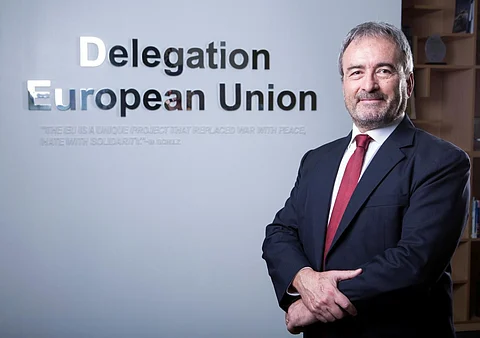
- NEWS
- the EDIT
- COMMENTARY
- BUSINESS
- LIFE
- SHOW
- ACTION
- GLOBAL GOALS
- SNAPS
- DYARYO TIRADA
- MORE

The European Ambassador to the Philippines Luc Veron is looking forward to the fulfillment of the Joint Trade and Economic Committee between the Philippines and the United Kingdom, seeing it as a formal mechanism to enhance trade, investments, and economic cooperation.
“This is a good platform for addressing market access issues and other regulatory concerns; promoting and realizing actual investments; and implementing economic cooperation initiatives. Hopefully, this year we can convene the 1st Committee meeting,” Veron said during the Doing Business in the Philippines 2024 press launch in Makati City on Wednesday.
Veron said the UK is the 21st trading partner of the Philippines, and it continues to offer a wide range of business opportunities for our stakeholders.
“With a more active engagement, it will not be a surprise if this trade and investment relations will be further enhanced soon. We see the UK as an important partner in almost all aspects of economic activities, that is, not only in trade and investments but even in education, innovation, and good governance,” he said.
The UK establishes JETCO with different countries to address trade barriers and improve the flow of trade in goods and services.
In Southeast Asia, the UK has JETCO with Indonesia, Malaysia, Thailand and Vietnam.
Partnership with the private sector
Also, Veron maintained that strong government partnership with the private sector is critical to ensure that investment promotion and facilitation strategies are fit for purpose, given the current market realities and demands.
“In any case, under the current Philippine Development Plan 2023-2028, among others, we are implementing targeted, granular strategies to increase exports on three fronts: global value chains, food and agri-marine, and labor-intensive manufacturing,” he said.
Veron said through the Philippine Export Development Plan 2023-2028, the EU aims to establish the Philippines as a leading exporter of high-value products and services by 2028, leveraging EU’s superior knowledge and talent to cater to diverse global consumer needs.
“We will focus on four key industry clusters: Industrial, Machinery and Transport (IMT); Technology, Media and Telecommunications (TMT); Health and Life Sciences; and Modern Basic Needs, Resilient Economy (MBNRE). Ultimately, the expected outcomes of the PEDP are diversified markets, improved market access, improved export scale and scope, and an improved export environment addressing policy and regulatory issues,” he said.
“I say this because as this development gains more traction, it is beneficial for UK companies to be part of this momentum and progress. UK companies can venture into manufacturing in the Philippines and take advantage not only of our big market but also of the bigger market in the region using our FTA network such as the RCEP,” he said.
Also, Veron said in the time of knowledge and a creative economy, fueled by the unprecedented advancement in technology, we need dynamic and innovative minds.
“And I can say that the Philippines would be a good partner in this area. More than being young, we have a strong intellectual capital, which is why it is not surprising that many Filipinos made a mark in Silicon Valley, and other innovative start-up engagements,” he said.
With a total population of around 115 million and growing to as many as 125 million by 2030, he said this sizable domestic market is naturally a main source as well of labor.
“In fact, 63% of the total population is of working age and every year, around 850,000 college graduates of different disciplines enter the workforce. A good number would be from engineering, science and technology courses that can support R&D and high-value activities,” according to Veron.
